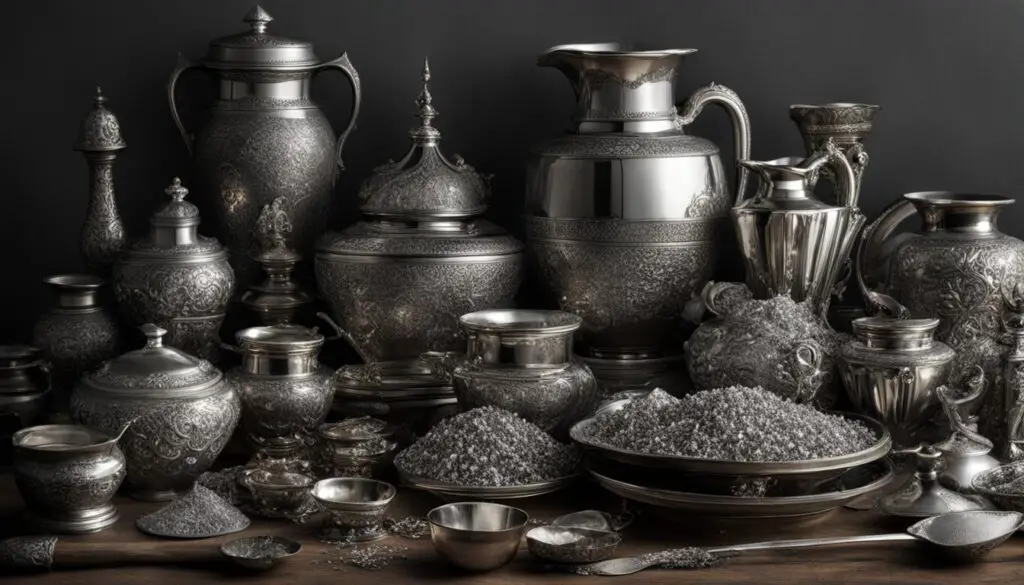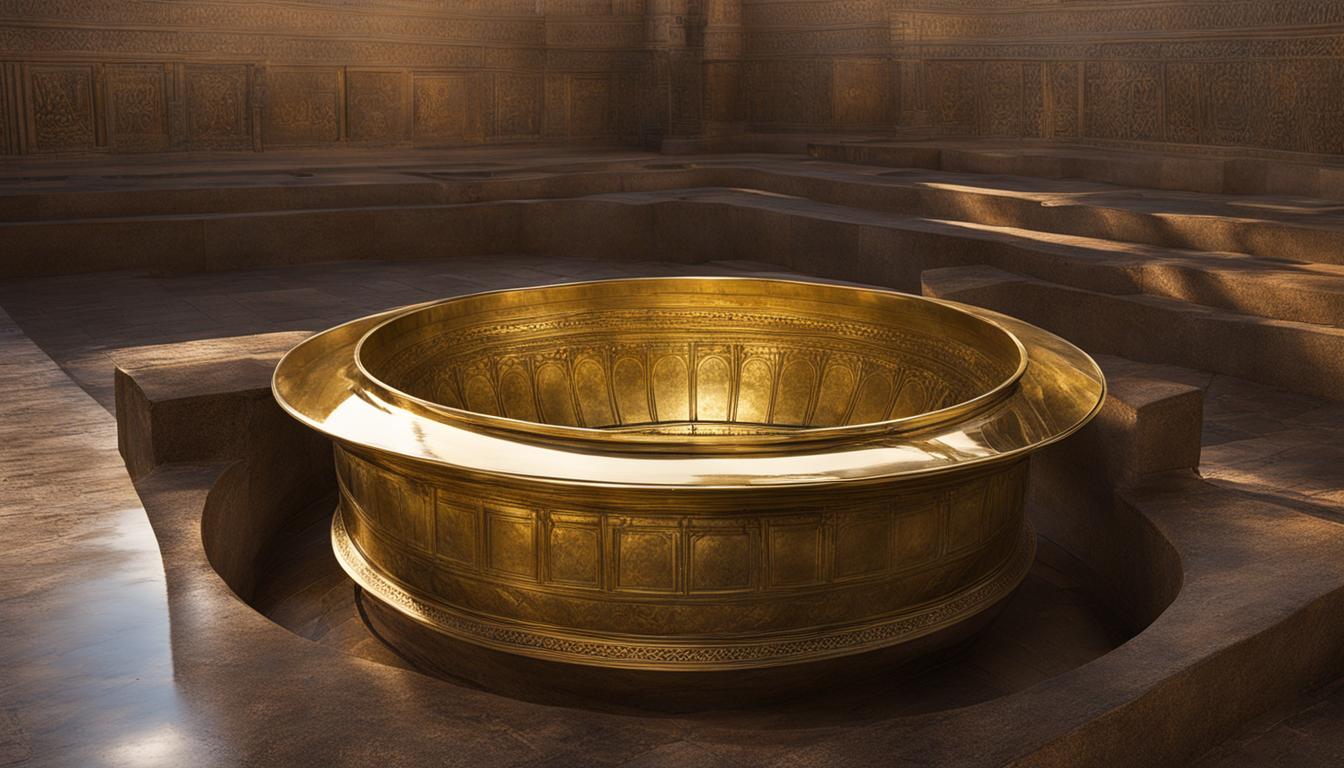Silver holds significant symbolism in the Bible, with 320 mentions in the King James Bible. It represents wealth, abundance, and purity, and is associated with various biblical references. Silver played a vital role in the construction of sacred spaces, served as a form of currency, and symbolized the rise and fall of kingdoms. However, the Bible also warns about the dangers of idolatry and valuing material possessions over spiritual principles. Understanding the value and symbolism of silver in the Bible can reveal deeper spiritual truths.
Key Takeaways:
- Silver holds significant symbolism in the Bible, representing wealth, abundance, and purity.
- It is mentioned 320 times in the King James Bible and is associated with various biblical references.
- Silver played a role in the construction of sacred spaces, served as currency, and symbolized the rise and fall of kingdoms.
- The Bible warns against idolatry and valuing material possessions over spiritual principles.
- Understanding the value and symbolism of silver in the Bible reveals deeper spiritual truths.
The Value of Silver in the Bible
In the Bible, silver holds great value and significance. It is mentioned in various contexts, symbolizing wealth, prosperity, and abundance. One notable reference is found in the story of Abraham, a wealthy man who possessed silver along with cattle and gold. This demonstrates the high value placed on silver during biblical times.
Another significant example is seen in the reign of King Solomon, known for his immense wealth. Silver played a pivotal role in Solomon’s kingdom, showcasing its importance and worth. The biblical references to silver’s value underscore its symbolism of wealth and prosperity.
“The silver is mine, and the gold is mine, declares the Lord of hosts.” – Haggai 2:8
Throughout the Bible, silver is associated with material riches, representing the tangible aspects of wealth. However, it is important to note that the true value lies not in material possessions, but in the wisdom and understanding that come from God. The significance of silver in the Bible goes beyond monetary wealth, reminding believers of the importance of spiritual abundance.
| Silver in the Bible | Silver in Society | |
|---|---|---|
| Symbolism | Represents wealth and prosperity | Valued as a form of currency and trade |
| References | Abraham’s possession of silver | Commonly used in business transactions |
| King Solomon | Associated with great wealth and abundance | Silver played a significant role in his kingdom |
Symbolism of Silver in the Bible
Silver holds a profound symbolic meaning in the Bible. It represents purity and is often associated with refining and purifying processes. Just as silver is refined through intense heat and fire, the Bible portrays God refining the hearts of his people. In the book of Proverbs, it is written, “The words of the Lord are pure words: as silver tried in a furnace of earth, purified seven times” (Psalm 12:6). This comparison underscores the notion that just as silver is purified, our hearts and souls can also be refined through God’s teachings and guidance.
“The words of the Lord are pure words: as silver tried in a furnace of earth, purified seven times.”
Furthermore, silver in the Bible is associated with wisdom. The book of Proverbs states, “Take my instruction instead of silver, and knowledge rather than choice gold, for wisdom is better than jewels, and all that you may desire cannot compare with her” (Proverbs 8:10-11). This passage highlights the superior value of wisdom over material possessions, emphasizing that true riches lie in the pursuit of knowledge and understanding.
Lastly, silver represents true value. In a world that often prioritizes material wealth and possessions, the Bible reminds us that the true worth lies in our relationship with God. The book of Psalms declares, “The words of the Lord are pure words: as silver tried in a furnace of earth, purified seven times” (Psalm 12:6). This verse suggests that the purity and value of silver can only be achieved through the divine.
The Symbolism of Silver:
- Purity and refinement
- Wisdom and knowledge
- True value and worth
These symbolic representations of silver in the Bible serve as a reminder of the importance of purity, wisdom, and true spiritual values. They encourage us to seek the refinement of our hearts and minds, prioritize wisdom over material wealth, and recognize the true worth that can only be found through our connection with God.
Silver as a Warning in the Bible
Silver in the Bible carries a cautionary message, reminding believers of the potential dangers associated with it. One notable example is the creation of silver idols, which can lead to the temptation of valuing material possessions over spiritual principles. This warning is emphasized through the story of Judas Iscariot, who famously betrayed Jesus for thirty pieces of silver.
“What will you give me if I deliver him over to you?” Judas asked the chief priests. And they counted out to him thirty pieces of silver.”
– Matthew 26:15 (NIV)
This narrative serves as a stark reminder of the consequences of prioritizing silver or wealth over more important aspects of life. It encourages readers to consider the potential pitfalls of placing too much importance on material possessions and serves as a caution against idolatry.
The Dangers of False Value
In the Bible, silver serves as a symbol of false value when it becomes the focus of one’s worship instead of God. The Israelites were repeatedly warned against esteeming silver and gold above their devotion to the true God. This serves as a reminder to believers to guard their hearts against the allure of material wealth and to place their trust in God alone.
As the biblical narrative reveals, the pursuit of silver can lead to a distortion of values and priorities. It is a powerful reminder of the temptation to prioritize earthly treasures over spiritual riches, cautioning believers to remain vigilant and mindful of their true source of fulfillment and worth.

Through the warnings and cautionary tales associated with silver in the Bible, believers are encouraged to examine their own hearts and intentions. It serves as a reminder that true wealth and value come from a genuine relationship with God and the pursuit of spiritual treasures rather than material possessions.
Silver in Business and Commerce in the Bible
In biblical times, silver played a crucial role in business transactions and commerce. It served as a widely accepted medium of exchange, used for buying and selling goods. The Bible contains numerous references to silver as currency, highlighting its importance in economic activities.
“Honor the Lord with your wealth and with the firstfruits of all your produce; then your barns will be filled with plenty, and your vats will be bursting with wine.” – Proverbs 3:9-10
These verses express the significance of honoring God through the proper use of wealth, including silver. It underlines the notion that successful business endeavors and financial prosperity are a result of acknowledging and prioritizing spiritual values.
| References | Description |
|---|---|
| Genesis 23:15-16 | Abraham’s purchase of a burial site with silver |
| Genesis 37:28 | The sale of Joseph to Ishmaelites for twenty pieces of silver |
| Matthew 26:14-15 | Judas’ betrayal of Jesus for thirty pieces of silver |
In addition to being used as a form of currency, silver also facilitated international trade. It was valuable across different cultures and nations, making it a valuable asset for commerce. The biblical narrative includes trade activities involving silver, showcasing its role in connecting people and facilitating economic exchange.
“She perceives that her merchandise is profitable. Her lamp does not go out at night.” – Proverbs 31:18
This verse emphasizes the profitability of merchandise, which includes goods traded with silver. It highlights the industrious nature of business and the positive impact it can have on wealth accumulation.
The use of silver in business and commerce in the Bible demonstrates its practical importance as a means of exchange and facilitator of trade. It serves as a reminder of the significance of conducting honest and fair transactions, and the value of utilizing wealth for spiritual purposes.
Silver in the Construction of Sacred Spaces
The use of silver in the construction of sacred spaces holds significant importance in biblical history. From the tabernacle in the wilderness to the permanent temple in Jerusalem, silver played a vital role in creating sacred objects and symbolizing the holiness of these spaces.
In the tabernacle, silver was used to create various sacred objects, including dishes, bowls, candlesticks, and musical instruments. These objects were meticulously crafted to honor and worship God, reflecting the reverence and devotion of the Israelites.
“And they shall take gold, and blue, and purple, and scarlet, and fine linen. And they shall make the ephod of gold, of blue, and of purple, of scarlet, and fine twined linen, with cunning work.” – Exodus 28:5-6
Similarly, in the temple, silver was utilized in the construction of sacred items such as basins and trumpets. The presence of silver within these sacred spaces elevated their significance and reminded the people of their devotion to God.
Table:
| Sacred Object | Description |
|---|---|
| Golden Lampstand | A seven-branched lampstand made of pure gold, with decorative almond blossoms and fruit. |
| Ark of the Covenant | A gold-covered chest that contained the stone tablets of the Ten Commandments and other sacred items. |
| Altar of Incense | A golden altar where incense was burned as a fragrant offering to God. |
| Table of Showbread | A table made of acacia wood overlaid with gold, used for displaying twelve loaves of consecrated bread. |

The use of silver in sacred spaces serves as a reminder of the reverence and devotion required in worshiping God. It underscores the importance of creating a space that reflects the holiness and purity of the divine presence.
Silver as a Source of Temptation and Idolatry
Silver, although valued in the Bible for its symbolism of wealth and purity, can also become a source of temptation and idolatry. The Scriptures caution against the worship of false gods and the creation of silver idols, emphasizing the importance of worshiping the true God. These biblical references serve as a reminder for believers to prioritize spiritual values over material possessions and to guard against the allure of wealth.
In Exodus 20:23, God commands the Israelites not to make gods of silver or gold, highlighting the dangers of idolatry. The worship of silver idols is seen as a betrayal of the true God and a distortion of His divine plan. This warning resonates throughout the Bible, as the pursuit of silver or material wealth can lead individuals astray from their spiritual path.
One notable example is the infamous betrayal of Jesus by Judas Iscariot for thirty pieces of silver. This act serves as a stark reminder of the perils of valuing silver or wealth over loyalty, integrity, and spiritual principles. It serves as a cautionary tale against the allure of material possessions and the potential harm that can come from prioritizing them above all else.
“For the love of money is a root of all kinds of evil.” – 1 Timothy 6:10
Ultimately, the biblical references to silver used in idolatry and the warnings against its worship highlight the importance of prioritizing a relationship with God and living a life characterized by spiritual values. Material possessions, including silver, are transient and can distract from the true source of fulfillment and purpose.

Table: Examples of Biblical References to Silver Used in Idolatry
| Biblical Reference | Context |
|---|---|
| Exodus 32:3-4 | The creation of the golden calf and worshiping it as a god |
| Acts 19:24-28 | The worship of the goddess Artemis, whose temple was adorned with silver statues |
| Revelation 2:20 | The condemnation of the church in Thyatira for tolerating a woman who led others into idolatry |
Silver in Biblical Prophecy: Symbol of Empires
Silver plays a significant role in fulfilling biblical prophecies, often symbolizing empires and their rise and fall throughout history. One notable reference is found in the book of Daniel, where King Nebuchadnezzar has a dream featuring a statue. The head of the statue is made of gold, representing Nebuchadnezzar’s Babylonian empire, and the arms and chest are made of silver, symbolizing the subsequent Medo-Persian empire.
The dream serves as a prophecy, foretelling the succession of powerful empires and their dominance over the ancient world. The silver in Nebuchadnezzar’s dream signifies the Medo-Persian empire, which indeed followed the Babylonian empire in history. This symbolic use of silver demonstrates how biblical prophecies utilize powerful imagery to convey profound messages.
“And after you shall arise another kingdom inferior to you, then another, a third kingdom of bronze, which shall rule over all the earth.” – Daniel 2:39
This prophecy not only reveals the succession of empires but also conveys the idea that each empire is “inferior” to its predecessor. The use of silver as a symbol for the Medo-Persian empire illustrates this concept, as silver is regarded as less precious than gold. Through the vision of the statue, the Bible communicates the cyclical nature of power and the inevitable rise and fall of human empires.
| Empire | Symbol |
|---|---|
| Babylonian Empire | Gold |
| Medo-Persian Empire | Silver |
| Greek Empire | Bronze |
As we delve into the biblical texts, it becomes clear that silver holds not only material value but also profound spiritual significance. Its inclusion in prophecies serves as a reminder of the transient nature of worldly power and the ultimate sovereignty of God’s plan.
Silver in the New Covenant
In the New Testament, silver is mentioned in various contexts, reflecting its significance in biblical times. It is often referred to as a form of money and used for exchange in commercial transactions. Jesus Himself talked about silver, using it as an example to teach his disciples important lessons about trust and spiritual wealth.
Jesus’ teachings on silver highlight the transient nature of material possessions and the importance of focusing on the eternal. In Matthew 6:24, Jesus says, “No one can serve two masters. Either you will hate the one and love the other, or you will be devoted to the one and despise the other. You cannot serve both God and money.” This emphasizes the need to prioritize spiritual values over material wealth, including silver.
“For where your treasure is, there your heart will be also.” – Matthew 6:21
The New Covenant also references silver in the context of idolatry and false values. In Acts 19:24-25, the story of the Ephesians’ worship of the goddess Artemis reveals the role of silver in promoting idolatry. It states, “A silversmith named Demetrius…made silver shrines of Artemis…He brought in no little business for the craftsmen.” This demonstrates how silver can be used to fuel the worship of false gods and highlights the need for discernment and faith in God alone.
Silver in the New Covenant
In the New Testament, silver is mentioned in various contexts, reflecting its significance in biblical times. It is often referred to as a form of money and used for exchange in commercial transactions. Jesus Himself talked about silver, using it as an example to teach his disciples important lessons about trust and spiritual wealth.
Jesus’ teachings on silver highlight the transient nature of material possessions and the importance of focusing on the eternal. In Matthew 6:24, Jesus says, “No one can serve two masters. Either you will hate the one and love the other, or you will be devoted to the one and despise the other. You cannot serve both God and money.” This emphasizes the need to prioritize spiritual values over material wealth, including silver.
“For where your treasure is, there your heart will be also.” – Matthew 6:21
The New Covenant also references silver in the context of idolatry and false values. In Acts 19:24-25, the story of the Ephesians’ worship of the goddess Artemis reveals the role of silver in promoting idolatry. It states, “A silversmith named Demetrius…made silver shrines of Artemis…He brought in no little business for the craftsmen.” This demonstrates how silver can be used to fuel the worship of false gods and highlights the need for discernment and faith in God alone.
Conclusion
In conclusion, the meaning of silver in the Bible goes far beyond its material value. It holds deep symbolism and spiritual interpretation throughout biblical texts. Silver represents wealth, abundance, purity, and refinement.
While silver is often associated with positive qualities, such as prosperity and holiness, it also serves as a warning against the dangers of idolatry and placing too much importance on material wealth. The Bible cautions believers to prioritize spiritual values over material possessions, using silver as a reminder of this important lesson.
Through its various mentions in the Bible, silver conveys divine messages and teaches us about faith and the human heart. It is a powerful symbol that invites us to reflect on the true meaning of wealth and the pursuit of a righteous life.
FAQ
How many times is silver mentioned in the King James Bible?
Silver is mentioned 320 times in the King James Bible.
What does silver symbolize in the Bible?
Silver symbolizes wealth, abundance, and purity in the Bible.
In which biblical books is silver mentioned prominently?
Silver is mentioned prominently in Exodus, Numbers, 2 Kings, and 2 Chronicles.
How was silver used in biblical times?
Silver was used as a form of currency, in the construction of the tabernacle and the temple, and for making jewelry and other items.
What role does silver play in biblical prophecies?
Silver symbolizes the rise and fall of kingdoms and empires in biblical prophecies, such as the dream of King Nebuchadnezzar in the book of Daniel.
What warnings are given about silver in the Bible?
The Bible warns against creating silver idols and placing too much importance on material wealth or valuing silver over spiritual principles.
How was silver used in business and commerce in biblical times?
Silver was used as a form of currency and was widely used for buying and selling goods in business and commerce.
How was silver used in the construction of sacred spaces in the Bible?
Silver was used to create various sacred objects in the tabernacle and the temple, symbolizing their importance and holiness.
How can silver become a source of temptation and idolatry?
Silver can be used to create idols and can tempt people to value material possessions or wealth over spiritual values in the Bible.
How does silver hold significance in the New Testament?
Silver is mentioned as a form of money and is used in exchange for goods in the New Testament. Jesus teaches not to rely on silver or material possessions but to trust in God.
What is the overall meaning of silver in the Bible?
Silver symbolizes wealth, abundance, purity, refinement, and the importance of true spiritual values over material possessions.







